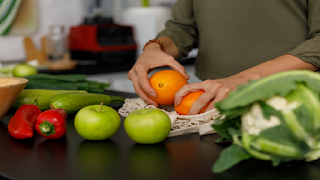-
Fruits, vegetables and herbs tend to spoil quickly if left uneaten, as biological processes continue even after harvest.
Fruits, vegetables and herbs tend to spoil quickly if left uneaten, as biological processes continue even after harvest.
These processes include: respiration, i.e. producing energy from stored carbohydrates, proteins and fats, with the release of carbon dioxide and water vapor.
Fresh produce also spoils thanks to various microbes, both harmless and those that can cause disease.
So, how can you combat food waste and keep produce fresher longer?
Freshness and quality start on the farm
Farmers always aim to harvest produce when it is in optimal condition, but pre- and post-harvest factors will affect freshness and quality even before the produce is purchased.
Pre-harvest factors include: climatic conditions, soil type and water availability. Post-harvest factors include: washing, cleaning, transportation, distribution, processing, packing and storage.
Consumers should pay attention to bruised or damaged products, as loss of moisture through damaged skin will accelerate deterioration and loss of nutrients. The damage also makes it easier for spoilage-causing microbes to enter.
Wash products
Experts say there is no need to wash produce before storing it. If you wash your produce and are unable to dry it completely, the added moisture may speed up the decomposition process in the refrigerator.
However, products should be washed immediately before use, to remove dirt and pathogens.
Studies indicate that vinegar has no effect on killing microbes in fresh produce.
Although there is some evidence that baking soda can remove pesticide residues from the surface of some products, it is not recommended at home.
Storage location
There are 3 storage options: on the counter, in the refrigerator, or in a “cool, dry, dark place,” such as the pantry.
Experts advise storing bananas, onions, garlic, potatoes, and pumpkin in a dark pantry or cupboard. Potatoes and onions should not be stored together, as onions produce a gas called ethylene, which makes potatoes spoil faster.
Fruits, such as apples, pears, avocados and bananas, should not be stored together, because these fruits release ethylene gas as they ripen, which accelerates their ripening and spoilage. Apples and citrus fruits can be stored together in the refrigerator.
It is recommended to store all leafy vegetables, carrots, cucumbers and cauliflower in the low-humidity drawer of the refrigerator. They can be placed in perforated plastic bags to retain moisture and air flow.
Most herbs and some leafy vegetables, such as celery, green onions and asparagus, can be kept with their stems in water to keep them fresh.
The report is prepared by Senaka Ranadeera, Associate Professor from the University of Melbourne.




She emphasizes proper storage and handling techniques for optimal quality.
ReplyDeleteInformative
ReplyDelete